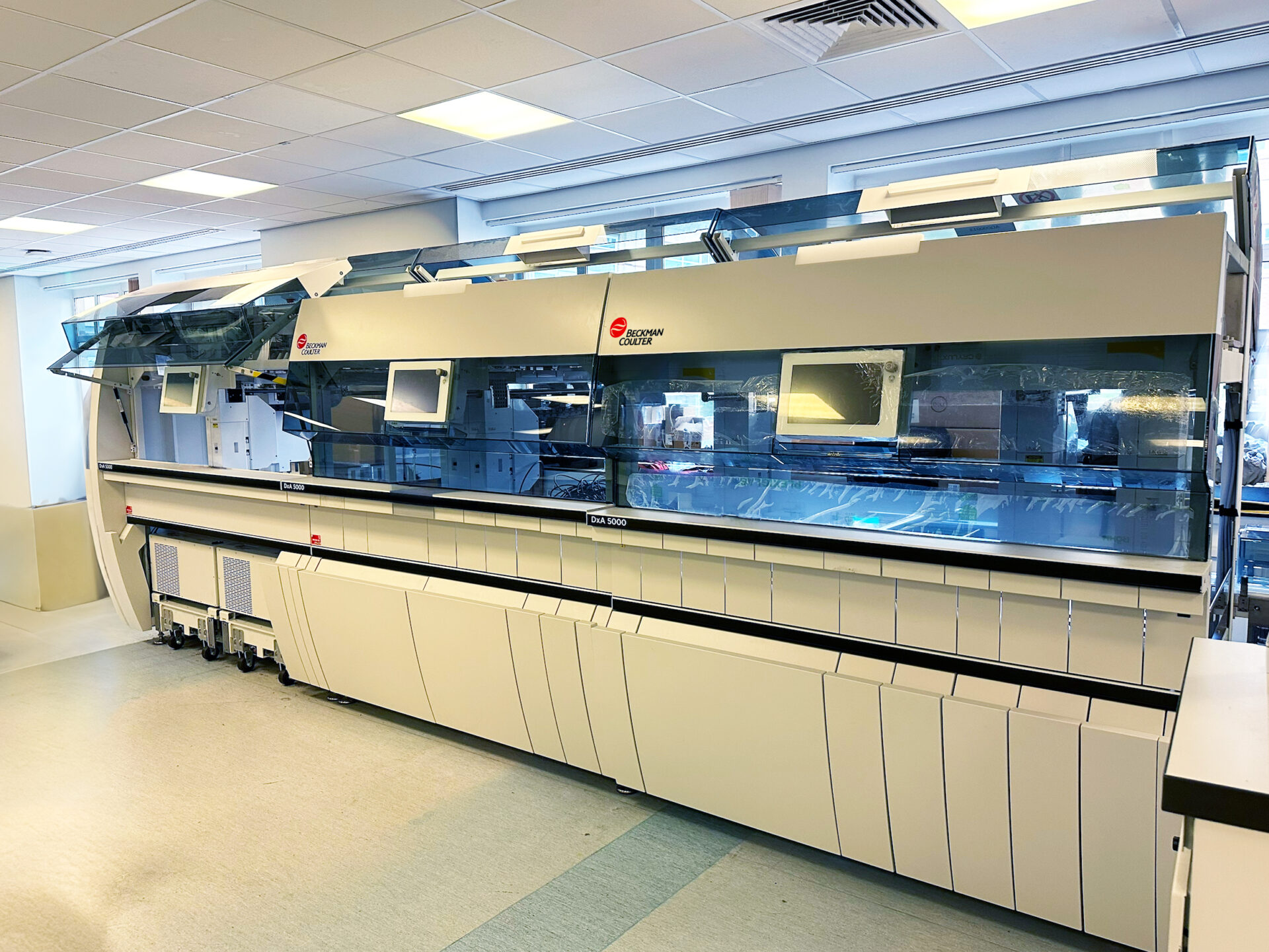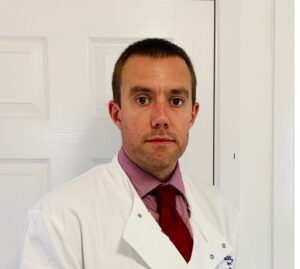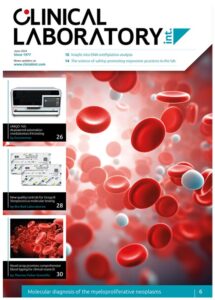Augmenting automation in the clinical laboratory
Running clinical lab tests is a labour-intensive business. Even if the actual test is done by an automated platform, many stages still require manual handling of the specimens, which can limit throughput and allow the potential for errors to occur (we’re only human, after all!). Increasing the amount of automation circumvent these limitations and CLI caught up with Dr Mike Cornes, Consultant Clinical Scientist & Pathology Clinical Director, and Jessica Patel, Biochemistry Laboratory Manager, at Worcestershire Acute Hospital NHS Trust to find out more about the impact of increasing the amount of automation in their workflow.
Firstly, can you provide some facts and figures about your department, please? For example, how many staff do you have, how many tests do you run on an average day, what kind of tests do you run most often, what are the main testing platforms/analysers that you have?
Mike Cornes (MC): Worcester Acute Hospitals NHS Trust is a reasonably sized District General Hospital covering three hospitals and a population of around 650 000 people. It has two pathology laboratory sites, one core laboratory covering all pathology disciplines and done blood sciences satellite lab site. From a biochemistry perspective, we run approximately 3500–4000 tests per day, equating to around 8–9 million tests per year. We run about 40% acute work and 60% primary care.
How satisfied were you with how the department was running and what pushed/pulled you to look into further automation of your workflow?
MC: Our pre-existing equipment was operating beyond its operational life and was at the end of its contract. In addition, workload was ever increasing as were the demands to turn lab results around as fast as possible with maximum accuracy in the results. Trying to do this on the existing equipment with the existing staffing pressures was highlighting inefficiencies in the way we worked. We were aware that since implementing the existing equipment there had been significant advances in automation which would support many of the improvements we needed to and wished to make in order to better serve our users and ultimately patients. We therefore went to tender for a solution to introduce automation and hence improve our efficiency and the service we provide.
Why was Beckman chosen?
MC: Beckman Coulter was awarded the contract following a rigorous tender exercise. Their solution was very competitive commercially but also gave us the highest confidence that they would be able to meet the requirements we had. The amount of effort that they had put into the tender process was also obvious and that provided further assurance over their commitment to Worcestershire. We were particularly impressed with the way they pushed work to the analysers allowing urgent work to be prioritized automatically. Additionally, their vision aligned well with ours and there appeared to be a desire to work together to develop a relationship, including site visits which allowed us to see their equipment demonstrated and the robustness of the tracking, something that has proven to be the case.
What role does the DxA 5000 play in your lab? What does it do, what tasks has it taken over from your staff?
Jessica Patel (JP): Before the DxA 5000 was installed, samples were processed by manually loading and unloading onto the stand-alone analysers. The DxA minimizes a lot of human intervention along the sample journey. This reduces potential errors and improves turnaround times (TATs) significantly.
DxA 5000 automation system (Beckman Coulter)
What impact has installation of the DxA 5000 had on the department?
MC: The implementation has predominantly been a success. There were teething issues, which were expected, but if I was told in advance it would go that well, I would have taken it. We have no regrets. In terms of impact, the main benefits have been the consistency of urgent work turnaround, the improvement in the turnaround of non-urgent work and the reliability of the hardware. Clinically, some short-term adjustments were needed by clinicians due to differences between suppliers, but this would have been the case whoever had won the tender. Where there have been minor clinical challenges, Beckman Coulter has worked with us to implement a solution. In addition, having online sample storage means that adding tests is now a fully automated process.
What does this mean for patients at the hospital?
MC: The reliable and improved TAT has meant that patients, on average, get their results quicker. This means an improved flow of patients and potentially quicker time to treatment. It also results in fewer phone calls to chase results, saving both lab and user time. We have observed the standard deviation of urgent TATs being reduced by 91%, as well as a 63% reduction in TATs for routine work. This means ultimately that patients are getting their results back a lot quicker, and – if we are processing the samples a lot quicker – that means the quality of the samples is better.
How has it been to work with Beckman Coulter Diagnostics on installation of the system – what tips would you have for other labs thinking about going down the same road?
MC: The key challenge was installing the system in limited space with a shortage of staff with a two-stage go-live process and challenging IT resilience. Planning the process through the installation stages was done together and we had regular update meetings to address issues as they arose. There were some errors made during the installation, which is always difficult to avoid in such complex procedures. The timing of staff training and some small miscommunications around logging challenges were noted, but we worked together to successfully rectify these. Clinically, our main challenge was with communicating change, specifically around reference ranges, but this was always going to be the case when changing providers.
If I was to do the process again, I would ensure training was better coordinated with equipment go-live dates and work to engage more with clinical teams to ensure they understood reference range differences.
What do you envisage for your partnership with Beckman Coulter, going forward?
MC: I hope that the partnership mindset we have with Beckman Coulter will continue and they will continue to ask for and listen to our feedback and suggestions. I also hope that they will continue to see Worcestershire as a key partner where they can beta test new products to the benefit of both Beckman Coulter and Worcestershire. We have a group of staff at Worcestershire who want to be at the forefront of trying new equipment and ideas, and will always be looking for ways together to improve what we offer.
JP: We are very excited to see what the future looks like and how the partnership with the company will evolve. It’s great to be the first in the UK to have had the aliquotter installed onto the DxA. It gives us the opportunity to give direct feedback to help improve the module which will not only help us at Worcestershire but also other labs that wish to install a DxA in the future.
We are also installing the DxI 9000 Access Immunoassay Analyser in the next year. Having seen the revolutionary developments of this new analyser I can only imagine what the next generation of clinical chemistry will look like.
With the increasing workload and pressures in the NHS, we are always looking for solutions to improve efficiency to keep up with the demands.
Knowing that the DxI 9000 Analyser does not require daily maintenance, essentially you are removing around 7 hours of downtime of the analyser per week. This would be further maximizing our throughput and improving staff satisfaction. Staff will not have to spend time performing the same mundane task and can use their expertise in more specialized areas.
As a trust we are all about using the best resources to get the best patient outcome and that’s where our partnership with Beckman Coulter fits right in. It’s all about aligning our goals and putting the patient at the centre it, and truly making a difference. Beckman Coulter have worked with us to ensure they provide the finest solution that fits perfectly for us and the level of service we like to provide.
There are still many developments yet to be made. With Beckman Coulter there is continuous improvement and it’s great to be on this journey with them.
We are currently in our second year with the DxA and we have already had a software upgrade with such an important feature, for example being able load samples onto the DxA that haven’t yet been registered in onto the LIMS. These sample are stored and processed as soon as they are booked in. Our bottleneck currently lies at the pre-analytics stage so a feature like this really benefits our lab.
With all these amazing developments there are many opportunities for staff to develop and enhance their skills. In this fast-paced world where technology is consistently developing at a blink of an eye, we need to ensure as a diagnostic lab that we keep up to date with this. It’s reassuring that BC are continually improving and working with us to build the vision we have for the future of Biochemistry at Worcestershire Acute Hospital NHS Trust.
The interviewees
Dr Mike Cornes, Consultant Clinical Scientist & Pathology Clinical Director, BSc MSc PhD FRCPath EuSpLm Worcestershire Acute Hospitals NHS Trust, Worcester City, England, United Kingdom
Jessica Patel, Biochemistry Laboratory Manager, BSc MSc MIBMS Worcestershire Acute Hospitals NHS Trust, Worcester City, England, United Kingdom






